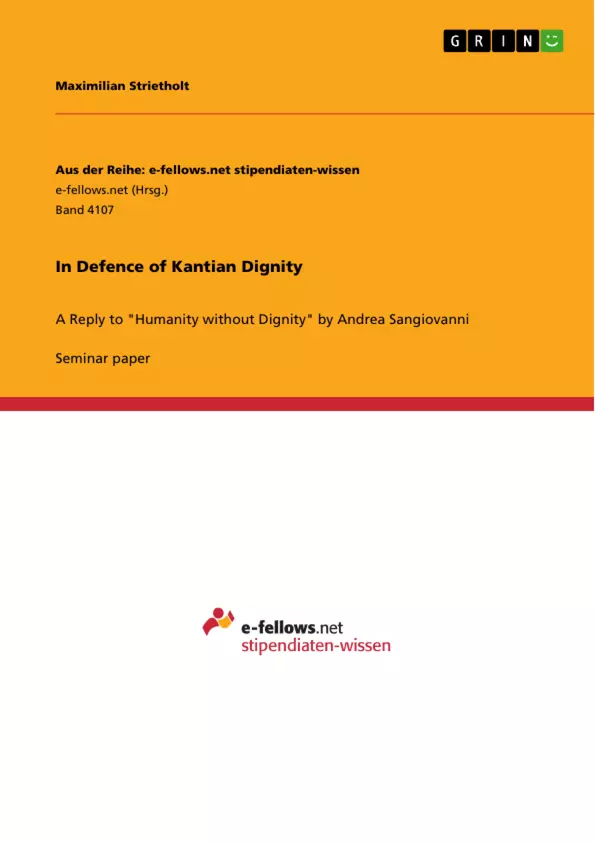In “Humanity without Dignity” Andrea Sangiovanni argues that we should abandon the idea of dignity as a basis of our commitment to moral equality and human rights. Sangiovanni considers two versions of the Kantian conception of dignity - the regress reading and the address reading - and argues that both of them fail to meet his desiderata.
My argument, therefore, proceeds in four steps, each of which seeks to show that the Kantian conception of dignity can in fact meet Sangiovannis desiderata. In section 2.1., I will argue that Sangiovanni misrepresents not only Kant’s own regress arguments, but also those of his scholars, and that his arguments therefore do not apply. Though my arguments are in this sense rather negative for large parts, I will try to deliver a positive argument by showing that Sangiovanni in fact has to concede that the regress argument can meet the rationale desideratum. In section 2.2., I contend that Sangiovanni does not sufficiently accommodate the idea of transcendental freedom - that is, the idea that we have to presuppose from a practical point of view that we are free and hence can act morally. As I will try to show, this also shows why the regress reading can meet the equality desideratum. Following this, we turn to the address reading of the Kantian conception of dignity. Here, I will argue that address Kantians can coherently claim that we are owed a justification for however anyone interacts with us, and hence can meet the rationale desideratum (section 3.1.). Finally, I will contend that the address reading can – as opposed to Sangiovanni’s argument - rule out most cases of slavery (section 3.2.).
Inhaltsverzeichnis (Table of Contents)
- Introduction
- The Regress Reading
- The Rationale Desideratum
- The Equality Desideratum
- The Address Reading
- The Rationale Desideratum
- The Equality Desideratum
- Conclusion
Zielsetzung und Themenschwerpunkte (Objectives and Key Themes)
This essay aims to defend the Kantian conception of dignity against the criticisms raised by Andrea Sangiovanni in his work, "Humanity without Dignity." Sangiovanni argues that any theory of dignity must meet two desiderata: the equality desideratum and the rationale desideratum. He contends that both versions of the Kantian conception of dignity, the regress reading and the address reading, fail to meet these criteria. The essay challenges Sangiovanni's assertions and argues that the Kantian conception of dignity can indeed satisfy both desiderata.
- The Kantian conception of dignity and its relationship to moral equality and human rights
- Sangiovanni's criticisms of Kantian dignity and the two desiderata he proposes
- The regress reading of Kantian dignity and its ability to meet the rationale and equality desiderata
- The address reading of Kantian dignity and its ability to meet the rationale and equality desiderata
Zusammenfassung der Kapitel (Chapter Summaries)
- The introduction lays out the central thesis of the essay: to defend the Kantian conception of dignity against Sangiovanni's critique. It establishes Sangiovanni's main argument, focusing on the need for any theory of dignity to meet the equality and rationale desiderata.
- Chapter 2.1 explores Sangiovanni's misrepresentation of Kant's and his scholars' regress arguments, arguing that Sangiovanni's criticisms do not hold up against a closer examination of the arguments' intended purpose and structure.
- Chapter 2.2 examines the role of transcendental freedom in the regress reading of Kantian dignity, arguing that this concept is crucial for understanding why the regress reading can meet the equality desideratum.
- Chapter 3.1 discusses the address reading of Kantian dignity and its capacity to meet the rationale desideratum by coherently justifying a demand for justification in all interactions with others.
- Chapter 3.2 further analyzes the address reading of Kantian dignity, demonstrating how it can rule out most cases of slavery, contrary to Sangiovanni's argument.
Schlüsselwörter (Keywords)
The key terms and concepts explored in this work include Kantian dignity, moral equality, human rights, Sangiovanni's critique, regress reading, address reading, equality desideratum, rationale desideratum, transcendental freedom, and justification.
Frequently Asked Questions
What is the main thesis of "In Defence of Kantian Dignity"?
The essay argues that the Kantian conception of dignity can meet the challenges raised by Andrea Sangiovanni and satisfies both the equality and rationale desiderata for human rights.
What are Sangiovanni's two desiderata for a theory of dignity?
Sangiovanni proposes the "equality desideratum" (explaining moral equality) and the "rationale desideratum" (providing a basis for our commitment to human rights).
What is the difference between the "regress reading" and the "address reading"?
These are two different scholarly interpretations of Kant's concept of dignity. The regress reading focuses on the value of humanity, while the address reading emphasizes the duty to justify our interactions with others.
How does transcendental freedom play a role in this defense?
The essay contends that presupposing transcendental freedom is necessary from a practical point of view to act morally, which helps the regress reading meet the equality desideratum.
How does the Kantian view address the issue of slavery?
The author argues that the "address reading" of Kantian dignity provides a coherent framework to rule out most cases of slavery, contradicting Sangiovanni's critique.
- Quote paper
- Maximilian Strietholt (Author), 2020, In Defence of Kantian Dignity, Munich, GRIN Verlag, https://www.grin.com/document/1187549



